Kalinouski Regiment Fighter ‘Kuś’: I Will Definitely Go To Liberate Belarus
19- 28.12.2023, 21:51
- 14,814
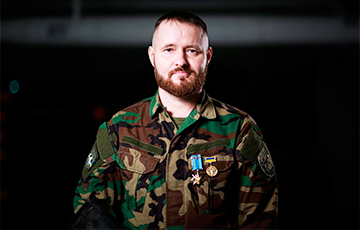
The amazing story of a Belarusian volunteer.
The story of the Belarusian volunteer from the Kastus Kalinouski regiment Aliaksandr “Kuś” Klachko is truly unique.
There is the Belarusian Republican Youth Union and participation in “election commissions” in it, but in 2020 he took to the street to protest against Lukashenka, and in 2022 he went to Ukraine to fight for Belarus.
On December 22, “Kuś” reported that “his kidneys did not survive Bakhmut” and was forced to leave the military service for health reasons. In an interview with the website Charter97.org, the volunteer said that even in this life situation he is ready to go to liberate Belarus.
“No one can convince me that the Russians and I are one people”
— You were born in Baranavichy, worked at the railway, in one interview you said that you even were in the Belarusian Republican Youth Union. What was your path to Belarus?
— I was Russian-speaking, but I always considered Belarusian as my native language. At the same time, I didn’t speak it; we, Belarusians, unfortunately, were taught to be ashamed of our native language and to avoid it.
In 1999, I was already in the opposition; I was then about 17 years old. I went to the Square in 2001 on September 9. Then I got disappointed and just walked away from it all. When I got to the railway, the Belarusian Republican Youth Union was being created there, I joined it, then I was even on the “election commission”, but I never voted for Lukashenka.
Around 2000, I took interest in the genealogy of my ancestors, I asked questions to my grandmothers, who were still alive, and my grandfather. I created a family tree, talked to relatives, wrote it all down.
Around 2018-2019 I had surgery, I injured my back and was on sick leave for three months. This gave me an opportunity to get into the National Historical Archive of Belarus, I went there 20 times. So I delved even deeper into the history of my ancestors and found a descendant of the last landowner, the owner of an estate in the village of Damashevichy.
A very interesting past was unveiled for me; even my parents, who were born in the village of Damashevichy, didn’t know half of it. For me, Belarus began with the discovery of the history of my small homeland, this became such a unique foundation. Now Damashevichy is a small village, about one hundred and fifty houses. The estate was burned by partisans at the end of the war, almost nothing remained, only the foundation. These lands were once owned by Ksawery Nesialouski, a brigadier general of Tadeusz Kasciuszka, who was a native of Liakhavichy.
Now that I know the history of my small homeland, here I am and here i stick, no one can convince me that I’m Russian.
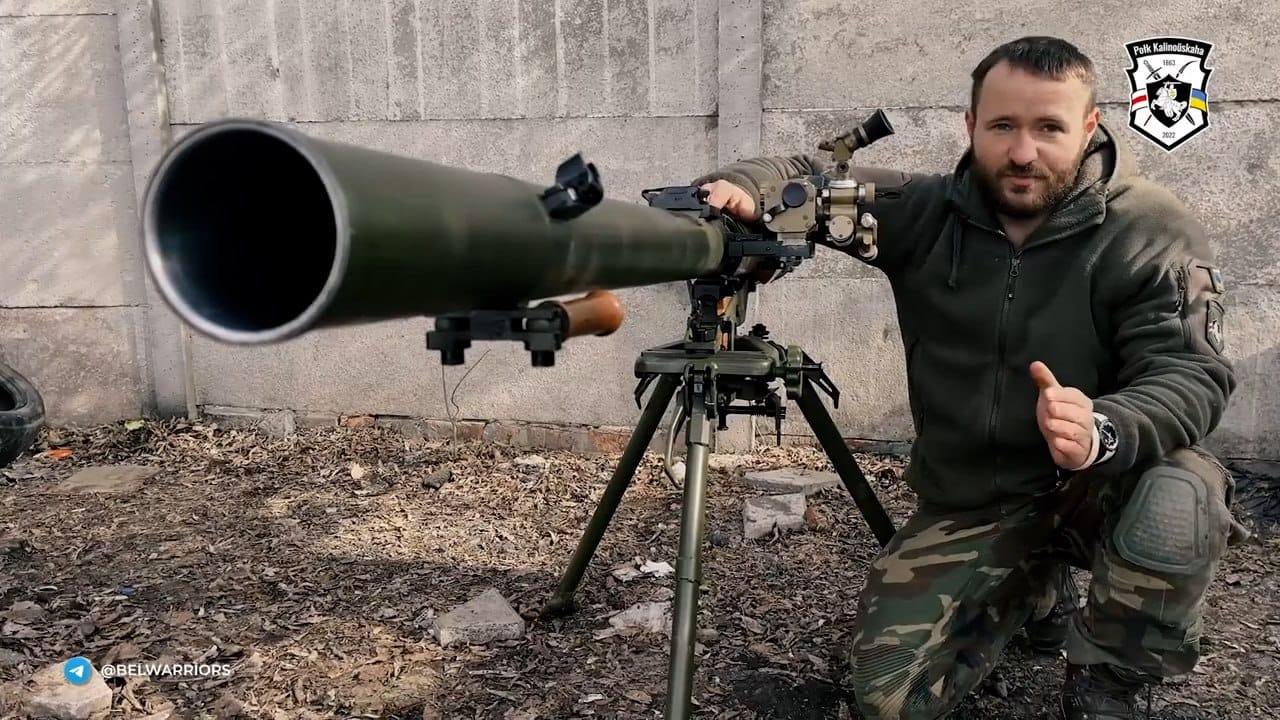
“Since 2014, my attitude towards Russia began to change”
Then the war began, Russia occupied the Crimea. I had an ambivalent feeling: wow, the Russians managed to occupy the peninsula almost without firing shots. Second thought: what will tomorrow prevent Russia from sending troops into Belarus in the same way without firing a single shot? Nothing.
From that time on, my attitude towards Russia began to change. In 2019, for the first time in the last 18 years, I went to Minsk to protest against integration with the Russian Federation. Pavel Seviarynets was the organizer of these actions. I remember I was scared to go there, it was an unsanctioned event, I knew about the consequences. I thought that there would be a harsh crackdown, as happened in 2010 or in 2017 during the “March of Non-Parasites.”
I decided to take part in the protests because I took the agreements being signed quietly, behind closed doors and without public discussion as a surrender of the sovereignty of Belarus.
“I would like to live in the Belarus which is shown on TV”
— In 2020, you joined the protests. What was the last straw for you?
— Then I saw the lies surrounding the coronavirus situation, I personally encountered it — my grandfather got sick. The last puzzle has been completed.
When I took part in the “elections,” I did not participate in falsification, but I saw indirect signs of falsification.
Previously, there were thoughts that maybe this only affects me, but in general everything is fine in Belarus. By the way, another thing that worked was television. I used to like watching the news, maybe ten years ago. And then there was a moment when I was watching TV and thinking: “Damn, this is an interesting approach, you listen — and everything is fine in our country. And if something is bad, then it happened once, it was already revealed, and the culprits were punished, all these careless directors of collective farms or enterprises.” I think, why don’t they ever say that there is something bad now, that something needs to be corrected at the moment?
Then I thought that I would like to live in the Belarus which is shown on TV. Then I simply stopped watching television and saw that the information was presented in a strange way. I didn’t know what influence television had, but now, looking at other people (not only Belarusians, but also Russians, even some Ukrainians), I understand why a TV set is called a “zombie box.”
And in the spring of 2020, I was faced with this situation, with lies about the coronavirus, like “he was fat, that’s why he died,” “he went to the wrong place, that’s why he died.”
I was very upset by this whole situation.
“I went against the lies that affected all spheres of life in Belarus”
I decided that in August I would go to Minsk and go to the Square. This lie forced me to go against the regime, to go to the Square again (after 18 years). The falsifications of August 2020 were only an additional trigger.
Then there were detentions of candidates, harsh dispersal, killings of people and other events. Three months later, I myself was detained; it was in Baranavichy during a regular tea party. I was without national symbols, I behaved perfectly (from the point of view of the law), we were all sober. Then fifteen cops detained me, hit me with a baton, and stole my money. Then, at the trial, three police officers gave false testimony against me; they charged me with “disobedience”.
After leaving the temporary detention facility, I wrote a statement to the Investigative Committee saying that my money was stolen and that there was an abuse of official authority. I didn’t have time to get to the prosecutor’s office to write a statement against three policemen; I had their names. I was even surprised when they gave me a protocol with the ranks and names of the police officers who gave false testimony against me.
At the same time, I gave my first interview for the local newspaper Intex-Press. I was detained on November 8, and on November 14 this interview was already published, to which even today, in relative safety, I have nothing to add.
In it, I talked about my detention, and at the end there was a main message: people, Belarusians, the main thing that the regime is afraid of is glasnost, this is the most dangerous thing for it. Therefore, Lukashenka is doing everything to keep us silent. If you see falsifications, become a witness, or some illegal actions have been committed against you, do not remain silent. Shout about it at every corner, tell people what is happening.
Then, by some miracle, I remained free for a month and a half. During this time I had various “activities”. When I was in the Belarusian Republican Youth Union, we were not involved in politics there, although I understand what this organization means. We helped various shelters and took part in competitions. I’ve never been an actor, but together with the guys we came up with different scenes and dialogues. I remember that I even wrote some poetry, and one guy who worked as a loader performed it as a rap. There were such creative activities for which in 2008 I received a certificate from the executive committee. And in 2020, roughly speaking, I was given a police report for the same thing. We can say that what I did at the Belarusian Republican Youth Union, I did in 2020, the methods are the same, creative. I simply used these skills acquired in the Belarusian Republican Youth Union to fight the regime.
A month and a half later, people in balaclavas came. I spent half a day deciding what to do, leave Belarus, stay. I remember my feelings — why should I leave, I didn’t violate anything. In a normal country, you will only receive a fine for participating in an unauthorized picket. But I understood that under Lukashenka this could lead to years in prison. I would have served another administrative detention, but I didn’t see the point in being in prison for several years.
It was possible to go to Lithuania, to Vilnius, without a visa, then there was a humanitarian corridor. For probably about nine months I still had this unpleasant feeling: did I leave on time? Maybe I could have struggled for one month more?
And then detentions began in Baranavichy, many people were arrested. Then I realized that if I had not left then, they would definitely have taken me.
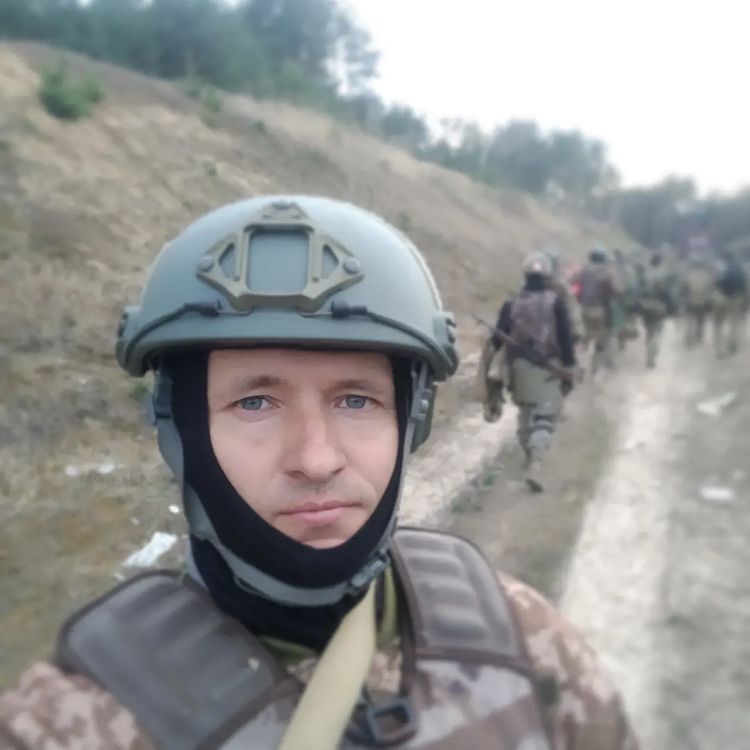
“I accepted that the dictatorship only understands the language of weapons”
— How did you decide to go to war? Why is the war in Ukraine a Belarusian case for you?
— Everything is simple here. Of course, I was for Ukraine when the war began, but I was more worried about the events inside Belarus. I was outraged that the territory of Belarus was used for the attack. On the day of the “referendum”, February 27, I was on Lukiškės Square in Vilnius. There was a rally against the war in Ukraine. Having returned home from this rally, I realized that if I don’t do anything now, then I have no moral right to call people in Belarus to do anything. I had an urgent need to act.
So what to do? Sitting in the safety of Vilnius, calling on people to do something, when Belarusians there are actually under the occupation of the regime and the Russian empire. And then a friend called me, who told me that at the Ukrainian Embassy in Vilnius you can sign up for the Foreign Legion. I found out how it needed to be done, went there, signed up, it was March 2. On March 3, they called me saying that the departure was in four hours, was I ready to go? “Ready,” I answered, although the clothes weren’t even dry after washing. On March 4 at six in the morning I was already in Ukraine.
I can single out two reasons why I decided to go to Ukraine, one is emotional, the other is a sober understanding of the situation. The emotional reason is that I perceived the attack on Ukraine from the territory of my native Belarus as another slap in the face from the Lukashenka regime. The first was election fraud in 2020. For me, a Belarusian, this was a personal insult.
On a logical level, it became clear to me when Putin supported Lukashenka in 2020, and not the Belarusian people, what Russia is for Belarus. But then I still believed in peaceful protest.
At the end of January 2021, after a month of being in emigration, I accepted for myself that the dictatorship only understands the language of weapons, the forceful option. It turns out that I, a supporter of peaceful protest, realized that we must fight not by drawing graffiti, videos or picketing, but rather by using force. How to do it? The answer appeared when a full-scale war began.
“If we Belarusians fight, we can win”
This war is a historic chance for me. A month before it started, I heard from one famous Lithuanian, poet Tomas Venclova, who spoke about the formation of Lithuania’s independence, that you can fight for freedom unsuccessfully for decades, but the real chance to get it comes when the hegemon that took this freedom from you becomes weak. They cannot put pressure on your territory, at this moment you can win independence. In Russia's defeat in this war, I saw a chance for Belarus to gain independence. Russia will be weakened as an empire (God willing, it will collapse), and if we, Belarusians, fight, we can win.
At the moment when I was going to war, the Russians were near Kyiv. I didn’t make any long-term plans, didn’t think about victory or anything like that, I just went to defend Kyiv, realizing that if the capital falls, then Ukraine will fall, then Belarus will not have a chance for liberation. But if Kyiv holds out, then this will be a chance; we have a common enemy with Ukraine. I emphasize that this is my position, I am not fighting for Ukraine in Ukraine, but I am fighting against a common enemy, against Russia.
I am grateful to Ukraine for giving us weapons and the opportunity to fight against the Russian empire. If for a Ukrainian the main thing is to liberate the territory of Ukraine, then for me this is only half the goal. My ultimate goal is the liberation of Belarus.
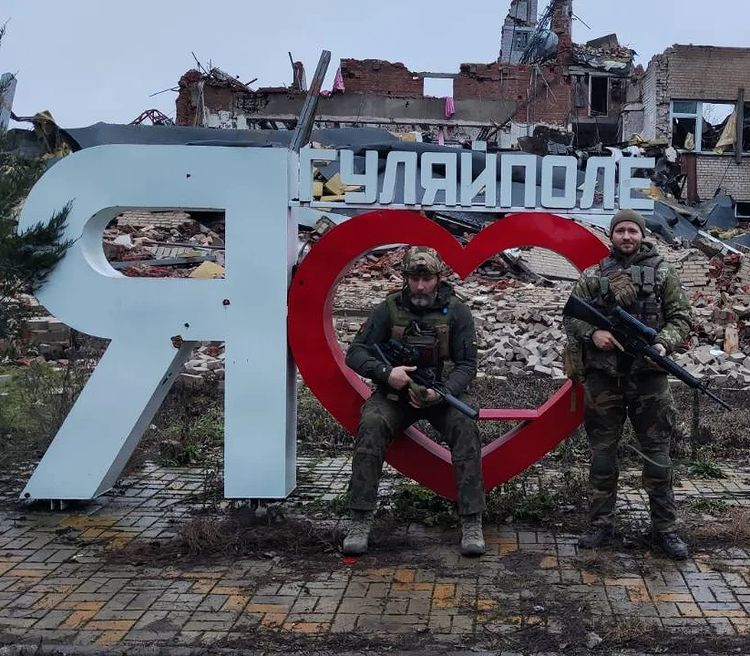
“The first fight makes it clear how your body will behave in extreme situations”
— You went through many battles, can you tell us about your most memorable one?
— The most interesting thing was the first battle, we were promised 10-20 coffins, that’s how many of us were supposed to die. Participation was voluntary; out of 100 Belarusians, 60 people took part in this battle. It was a joint operation with the Ukrainians, an assault on the village of Lozove on the border of the Kherson and Mykolaiv regions. We participated in this battle as stormtroopers, and the assault battle is probably the most emotional.
Our group set out from the base; there was a forced march, we crossed a river, a field, a forest with mines, and stormed a village. Everyone had different roles: some took part in the assault, some manned the mortars, some provided cover. Don’t ask any of the guys — such a blockbuster can be made there. Mortars were firing at us, helicopters were firing, and the plane was apparently engaged; we heard on a captured Russian radio that “a swallow is taking off.” The “boxes” were working on us, at least three tanks, they were covering us with arc fire.
We took the village and captured three Russians. Then, at the end of the day, after incessant shelling, we were given the order to go back across the river. There was also an interesting moment, “Brest” (Ivan Marchuk), “Dziadzka” (Pavel Shurmey) and I went to look for a wounded Ukrainian officer who had caught a mine, his leg was torn off in that battle. At first there was a version that he was captured by the Russians and they were luring us over the radio.
There were a lot of interesting things. I will say that the first fight makes it clear how your body will behave in extreme situations. No training ground will show this, only real combat conditions. I liked it, I liked my feelings, everything was interesting. There is an opinion, and I completely agree with it, that war, first of all, is not blood, but sweat, and only then blood. It was very difficult physically in this battle, especially during the evacuation of the wounded.
This first fight was the most emotional. Then we already worked with the Milan (an anti-tank missile system jointly developed by France, Germany and Italy — edit.), with the Sapog (SPG-9 — a Soviet mounted anti-tank grenade launcher), this is no longer an assault weapon. Milan is working from scratch. We worked with the “Sapog” from positions located approximately one and a half kilometers from the front line, using overhead fire with fragmentation shells to destroy enemy personnel in open areas and behind light fortifications such as trenches, dugouts, and buildings.
At the end of June 2022, I returned to Vilnius after the “first” Lysychansk. On the second day of my stay in Vilnius, June 26, four of our guys died near Lysychansk (including Brest), two were captured.
I had to do some paperwork in Vilnius, I stayed there for two and a half months and returned to the war. In September 2022, I purposefully returned to Ukraine to join the ATGM team. I did this because the guys near Lysychansk died while holding back a breakthrough of a column of Russian tanks. Russian armored vehicles then tried to encircle some of the Ukrainian Armed Forces fighters who were still there.
I decided that I wanted to join the ATGM team and fight armor.
“The most important thing is that we saved the lives of many of our guys”
On October 3, 2022, there was a combat exit, the first one after returning. We were in an ambush, at a distance from us the guys stormed the Russian positions, and we covered the road with an ATGM. And at some point, on the other side, from the forest belt, which was a “gray” zone, the Russians began shooting at us with automatic weapons. Milan's crew consisted of three people: the commander, me, and another fighter. We were covered by Vaǔkałak’s group (Dzianis Urbanovich), there were five of them. An ATGM is not a weapon for assault combat, and clearly not for infantry.
When the five Vaǔkałak’s guys were already exchanging fire with the Russians, our commander gave the order to support the Vaǔkałaks with machine gun fire (we expected that the Russians might try to bypass us and take our position by storm). Our commander stayed on the Milan to watch the road, and we joined the guys. I think there were about the same number of Russians as us; they were not particularly visible in this “greenery”. A distant firefight ensued. At some point, a Russian tank drove onto the road we controlled to work on our guys storming the Russian trenches in a neighboring field.
Our commander fired three missiles from an ATGM, one or two hit, but for some reason did not penetrate the armor. At the same time, the tank drove in reverse behind the hill. It never fired at our people. In the evening we received information from the Ukrainians that the tank no longer moved under its own power, and we did cause some damage to it. What happened to the crew is unknown. Perhaps it was shell shock or something else, but the most important thing is that they saved the lives of many of our guys. Only one person died then, but if this tank had started working against ours, there would have been more dead.
In Bakhmut we worked with Milan more in dugouts and observation posts. I remember that they fired once (then on the eastern border of Bakhmut), quickly turned up, ran across the trench, then across the open space into the dugout, and two minutes later a helicopter fired cluster shells at the place from which we were shooting. We managed to take cover. The tank also fired at us, but it overshot and the shell exploded about 50 meters away.
“You hit right into the dugout”
On New Year's Eve 2023, we began to master the “Sapog.” At first I didn’t like working with it; in fact, we used it as a mortar, which is located at a distance from the front line. And I liked being at the forefront the most. I didn’t particularly aspire to become an assaulter, but I didn’t want to be a mortarman either. And here we worked with arc fire, at a distance of 2-4 kilometers to the target.
“I didn’t sign up for this. Why do we need this “Sapog”?” — I had such thoughts, and then I worked with it, I realized that for “Milan” there are not so many goals, and with the “Sapog” — just give it shells. To work on dugouts and infantry. I realized, having worked with the “Sapog” several times, that its use is much more effective than I would have achieved with a machine gun at “zero”, sitting in a trench.
In February, my brother-in-arm “Vayar” handed over the radio after working with the “Sapog” in Bakhmut and the Ukrainian officer said to him: “Are you Vayar? (the call sign of our crew was “Vayar”) Well done, let me shake your hand, you did a very good job.” I saw “Vayar” returning to our basement, his eyes glowing with satisfaction like headlights in the dark. I understood without words what had happened there. Even during the day, the Ukrainians told us on the radio things like “well done, you did a good job, thank you very much.”
He said: “The Ukrainian officer was at the headquarters, heard that I was “Vayar”, shook my hand and thanked me.” “Vayar” looked like he had just had a daughter. Such interesting observations.
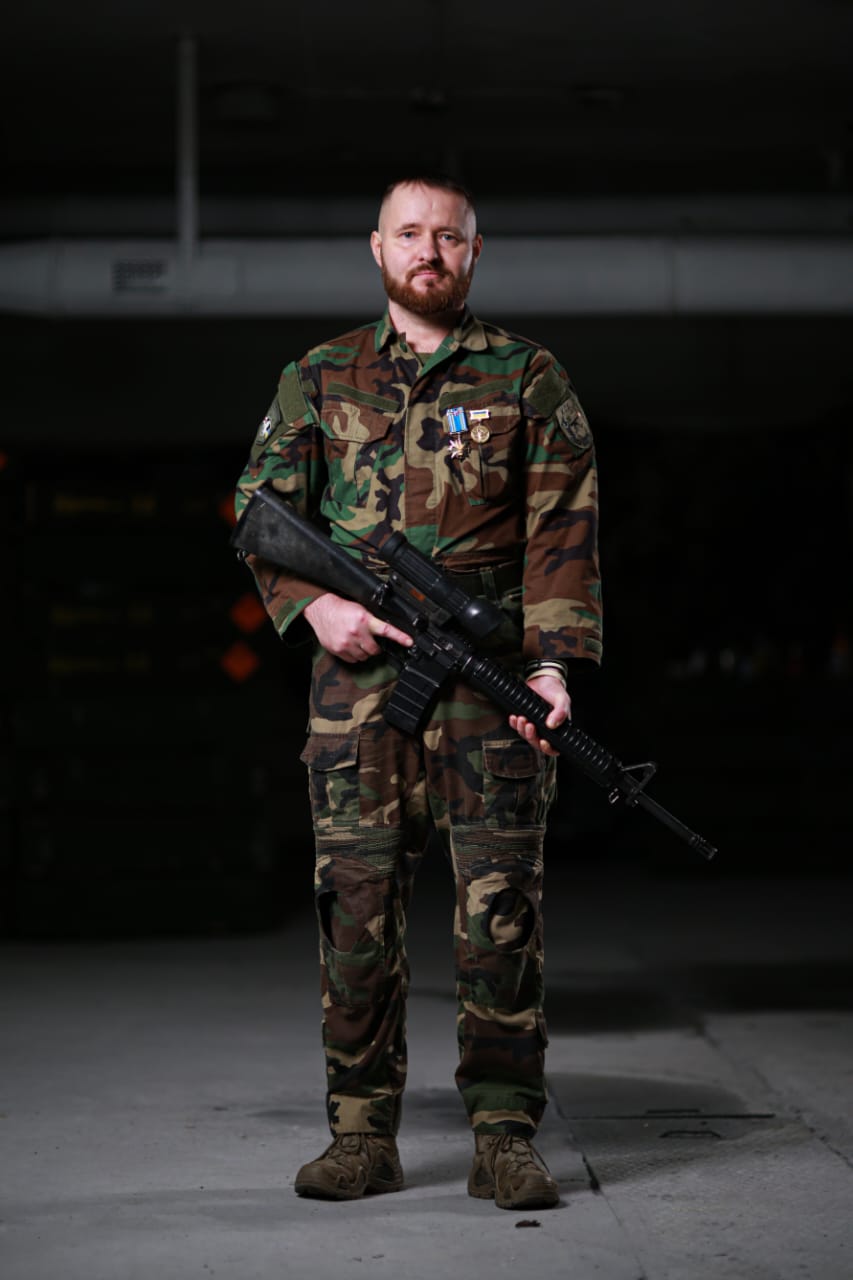
The most memorable moment with the “Sapog” was near Horlivka at the end of February. We worked with Ukrainian special forces officers, we were transferred there from Bakhmut, we were given the coordinates of the Russian dugout point, 3.5 kilometers from us. I made calculations on the “Kropyva” (an automated system for coordination between different branches of the military — edit.), but our “Sapog” was new, we did not know how it shot. I told “Vayar”, he was the gunner: “Let’s deduct 30 meters”, there are no our positions anyway, and our previous “Sapog” had a 70-meter overlap, we knew this and always deducted them during calculations. He asked: “Are you sure?” I said: “I’m sure.” I don’t know why, intuitively I suggested doing this. He aimed, shot, and they told us over the radio: “You hit right into the dugout. Let’s throw three more shells there.”
“The Ukrainians, with whom I was at the forefront, will support the liberation of Belarus”
— What do you see as the mission of Belarusian volunteers in Ukraine? Because today many people say that our guys are dying, maybe it’s better to take care of yourself for Belarus. What would you answer to these people?
— I formulated this for myself a long time ago, looking at our “stormtroopers,” because there the risk of dying is higher. I understand that we must help Ukraine fight Russia, including at the front. In Ukraine, Belarusians must fulfill the assigned tasks, but they must save their lives.
After all, no one except us, Belarusians, will liberate Belarus. Support — yes, but liberate for us — no. First of all, this is our task. No one will solve it except us. The Ukrainians told us: “We will win and will help you in the liberation of Belarus.” I think this is how it will be. From those Ukrainians who were with us at the forefront, I always heard only words of gratitude. I am sure that when the time comes, they will support the liberation of Belarus in one way or another.
Complete the mission, fulfill your task in Ukraine, bring Russia’s defeat as close as possible, but save your lives for Belarus. I see such a mission for Belarusians.
“My kidneys did not survive Bakhmut”
— During the war in Ukraine, you had health problems. Can you tell us about them?
— I finally passed the military medical commission. This is the main moment, one of the final points in this epic, which has been dragging on for the last six months. In short, my kidneys did not survive Bakhmut. Throughout February our crew was in combat mode. Then we were based in a basement in Chasiv Yar, which is 8 kilometers from Bakhmut, where we went to work. The basement smelled of mold, dampness, and water was dripping from the ceiling. My brother-in-arms took a paint roller and, before going to bed, ran it across the ceiling to remove condensation.
We were all sick, joking that the battalion should be named not “Volat”, but “Omicron”. They didn’t do a test, but they thought it was coronavirus. I had a fever of around 38, a very deep cough, this had never happened in my life. In the cold in Bakhmut I felt fine; I went down to the basement and an attack began.
At the end of February, I noticed that I began to feel nauseous and had some weird taste in my mouth. I didn’t understand what was happening, I thought it would pass. Then we had a rotation for three weeks in March. The last time I was in combat was in April 2023. The nausea did not go away, but became even worse. We rotated, went to rest at the base, and I was feeling increasingly worse.
I took tests and half of the indicators were off the charts: cholesterol and everything else. I didn't even know what they meant. I consulted a doctor, she said that there was something wrong with my kidneys. Did an ultrasound. I won't tell you the details. I struggled with the disease for three months and saw different doctors.
The process was active, my kidneys were dying. I was in the hospital for two and a half months and they prescribed medications for me with varying success, I already thought that there would be dialysis, the test indicators were jumping up and down. We picked up medications, now I take 17 tablets a day. And as a result of this illness, I was discharged.
According to the decision of the VLK, the disease is associated with the defense of the fatherland, that is, it was acquired during combat operations. Recently I was recognized as a person with the second degree of disability, which means I cannot be in the Armed Forces of Ukraine on a contract, so I am now returning to Vilnius. This is my case.
I wanted to add that I used to have an army front, but for the last six months one front has been the fight against the disease, and the second has been the fight against the Ukrainian bureaucracy.
Here the girl from the Kalinouski regiment, who takes care of the wounded, helped a lot, helped with the papers, with all the paperwork, thank her very much. That's it in short. If we talk in detail, there are a lot of nuances. It took a lot of energy to go through this path, treatment, not everything was easy. All these bureaucratic procedures are another quest that sometimes seemed insoluble.
“I’m ready to go to Belarus even with sick kidneys”
— Have you already decided what you will do in Vilnius?
— There were offers to stay in Ukraine. But I’m going to Vilnius and applying for refugee status. Then I’ll go to the doctors, because I need to be monitored, an irreversible process is going on in the kidneys, my protein level is at a very high level, this indicates that the kidneys are gradually dying. It may be necessary to review the medications; for this, a permanent nephrologist is needed. I see that dialysis and a kidney transplant await me, but this will probably be in a year, maybe in three years, maybe more. Half of it depends on me, the other half depends on the circumstances. Now I’m taking pills, on a special diet, and I don’t drink alcohol at all.
I try to cook in a slow cooker as much as possible; I don’t add salt to my food. I only eat 60 grams of meat per day. Such restrictions that must be adhered to in order to postpone the dialysis process. In Vilnius, as I already said, I am applying for refugee status. I will solve the issue of employment and treatment.
I plan to get back on my feet more or less, because for three years I put my main goal, the liberation of Belarus, in the first place, and my personal plans in the second place. But the liberation of Belarus remains my goal.
In Vilnius, I see the spread of Belarusianity as my key activity. This is language, history, culture. I believe that this is the initial foundation — this is where everything begins. I have it. If I didn’t have this national foundation, if I forgot who my ancestors were, then I would have long ago broken down, stopped, and been disappointed. I would simply be a labor emigrant, relatively speaking. But my goal was, and remains, the spread of Belarusianity and, as I say half-jokingly and half-seriously, I’m ready to go to Belarus even without kidneys. Actually, I was thinking about this.
In Belarus, you can die liberating it. Even if it's a one-way journey. And as I resolve my everyday issues, I will direct the remaining energy towards the approaching defeat of Russia and the liberation of Belarus. Albeit by other means. Because I believe that language is also a weapon.
Another important point, if we are talking about kidneys, my commander, when he found out that I was being commissioned, told me: “Kuś” you lost your health in the war. Maybe you regret it? I replied that I don’t regret it, and if they brought me back and said that at the end of 2023 my kidneys won’t be working half as well as they used to, then I would still go to war, I would just put on warmer socks and a belt made of wolf hair (as for socks and a belt — this is a joke).
For me, my destiny, my path that I have walked, is an intangible value. I have a goal and I'm going towards it.
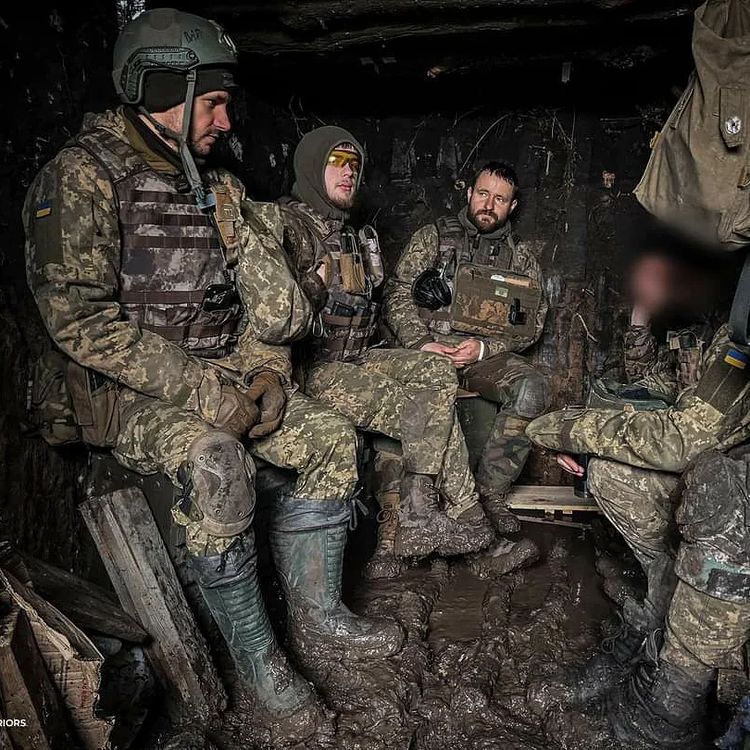
“Heroes of the Year — Belarusians of Action”
— Aliaksandr, New Year is coming, it’s time to take stock. Who do you think is the main hero of 2023?
— There are different areas. You cannot compare a herbivore with a predator. Who is better? Everyone is the best in their own way. Therefore, if we take it from a combat point of view, then in 2023 I will name Dzianis ‘Vaǔkałak’ Urbanovich among the living, and among the dead, it will be “Mouse” (Miraslau Lazouski), of course. If we take Belarusians within the country, then this is the Belarusian (I don’t know their last names) who, despite everything, is in Belarus and continues to fight against the Lukashenka regime and imperial Russia. What kind of struggle this is is a secondary question. Everyone has their own capabilities, willingness to take risks, but the Belarusian of action is the hero of 2023 for me.
Belarusian partisans, Belarusians who spoke the Belarusian language all their lives or switched to the Belarusian language. For me, these people are heroes.
Abroad — I don’t know. A lot of them. Basketball player Katsiaryna Snytsina, her Belarusian-language Instagram account, her spirit, her faith in victory.
I would also put political prisoners, people imprisoned for their civic position, on a level with volunteers. These are Palina Sharenda-Panasiuk, Mikalai Statkevich, Pavel Seviarynets and other political prisoners who did not break down, and continue their struggle even in prison.
The volunteers in Ukraine are also worth noting; there are not many Belarusians among them, but they exist. These people help both the military and the civilian population, they are also heroes of 2023.
— What do Belarusians hope for today? What are you hoping for today?
— I think that first of all we need to rely on ourselves. We Belarusians are strong. It’s just not all of us know it. Let's take the example of Ukraine. If Ukraine had not begun to rely on itself in the first days of the war, if it had not begun to resist, no one would have helped Ukraine; today it would be under occupation.
Sometimes there are situations when everyone around you says that you won’t succeed, but I answer that I will try. And I call on all Belarusians to act on this principle in the coming year. When you doubt or are told that nothing will work out, everything is lost, answer this to yourself and others: “I’ll try.”
If we don’t try, we will never succeed, but if we try, we may succeed. And when we succeed, everything around us will begin to help.
I’ve heard many times since the beginning of the protests that it won’t work, but I tried and strange things happened: support came, something worked.
Nobody will respect us until we start fighting. No one will take us into account until we start defending ourselves. We must fight for what is ours, or disappear as a nation.











